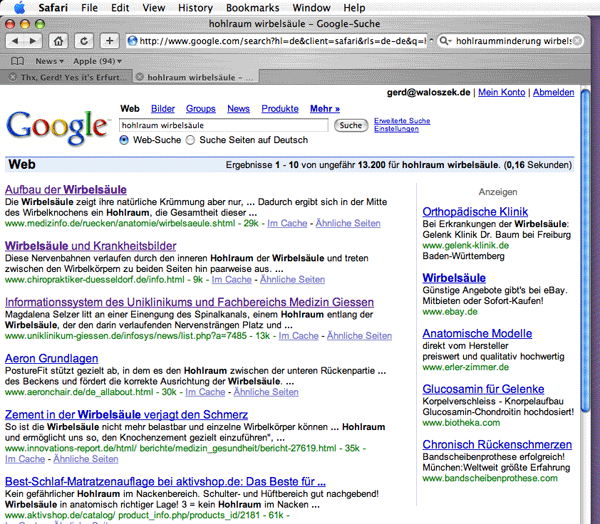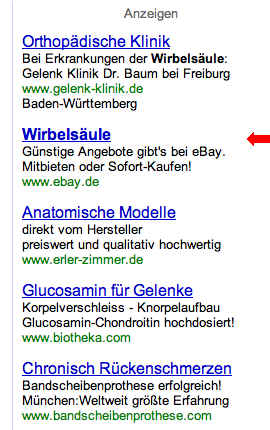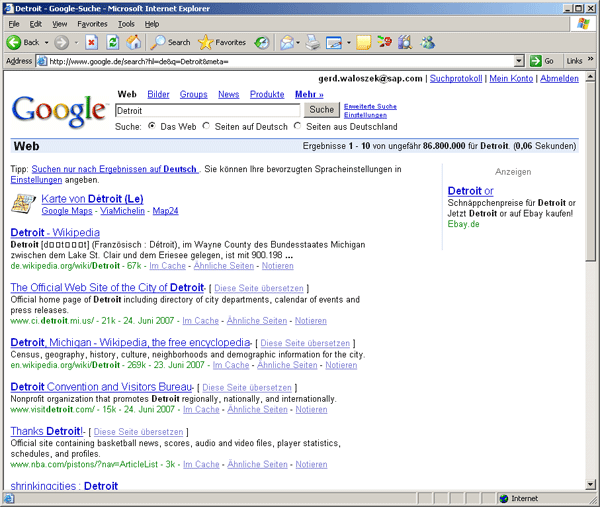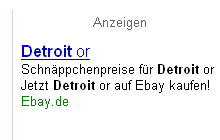Google & eBay Driving Me Crazy
By Gerd Waloszek
The Story
At usability conferences, the Websites of Amazon, Google, eBay, and the like usually receive a lot of praise. One reason for the praise they get is their ability to offer related information. For example, when you buy a book at Amazon, they list similar books, which might also be of interest for you. As another example, when you search the Web with Google, Google provides links with related ads to the right of the search hit list. These ads are paid for and one of Google's sources of making money. Usually, I pay little attention to these ads but this time, I did. Here is my story.
Recently, I needed information about the shrinkage of cavities in the human spinal chord. So I went to Google to search the Web for information related to that topic. First, I entered the German phrase "hohlraumminderung wirbelsäule" into the Google search field, meaning about that what I was searching for. My wife had already search for this phrase before without success. Not surprisingly, I had no success, either. So, I shortened the search term to "hohlraum wirbelsäule" (English: cavity, spinal chord) and got the following result screen:

Figure 1: Results for the German search terms phrase "hohlraum wirbelsäule"
As you can see from the link colors, I checked three links: Two of them offered useful information, the third was broken. Then, I looked to the right side of the window, where the related ads are located – and nearly got an heart attack. Have a look for yourself:

Figure 2: It is very comforting to find that you can buy or bid for a new spinal chord at eBay.
For the English-speaking visitors, here is my translation:
Spinal Chord
Low priced offers can be found at eBay. Place your bid or buy immediately!
When I see ads like this, I get furious – even though I'd better burst out laughing. On the one hand, I just got a free demonstration of how stupid the algorithms are, which assemble the related links. On the other hand, I regard the nonsensical eBay ad as an intrusion into my private life. The Google motto seems to be "In case of doubt, let's place an eBay link there." As if there weren't enough places on the Web, where I stumble across eBay links. There are cases, though, when even Google refrains from placing ads in that area. Maybe, these search terms are too obscure for the algorithm...
The Moral
For me, the simple moral of this story is that business comes first. Nobody seems to be ashamed of such "information breakdowns" any more, and nobody seems to worry. Users see the nonsense and, depending on their moods, laugh or get furious. But then they move on "as usual." There are, however, cases, where such information breakdowns are not as harmless as the one shown above. The real question is, how much we can trust in information from computers that has been generated automatically using some obscure algorithms or heuristics. The transition from misinformation with harmless consequences to one serious with consequences is smooth and not always noticeable.
Post Scriptum
Now, if you can buy a new spinal chord at eBay – what else can you buy there? I tested a number of obscure things, but without success. However, after I had given up this "game" and entered a word for another reason into the search box, I was successful:

Figure 3: You can also buy the city of Detroit at bargain prices at eBay

Figure 4: Detail
Probably, there won't be too much run on this offer, given the current situation of the American automotive industry...
Originally Published: 06/26/2007 - Last Revision: 01/31/2009
Gerd Waloszek |
made by |
